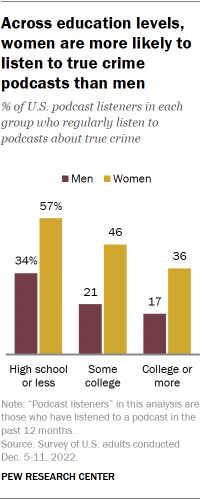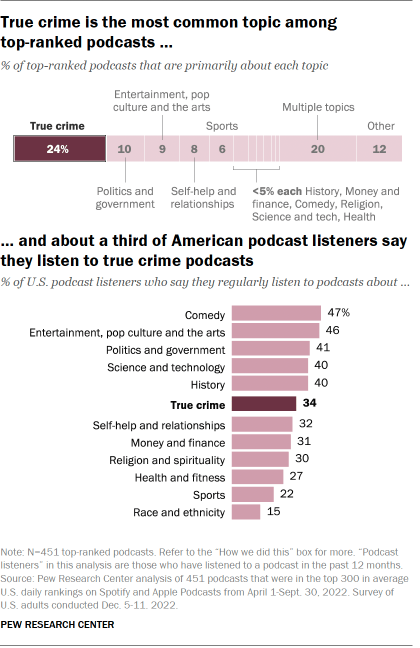
True crime stands out as the most common topic of top-ranked podcasts in the United States, according to a new Pew Research Center study. So who, exactly, listens to true crime podcasts?
Pew Research Center conducted this analysis to explore U.S. adults’ views of and experiences with podcasts as a part of the news and information landscape.
To examine the ways Americans get news and information in a digital age, the Center surveyed 5,132 U.S. adults from Dec. 5 to 11, 2022. Everyone who completed the survey is a member of the Center’s American Trends Panel (ATP), an online survey panel that is recruited through national, random sampling of residential addresses. This way nearly all U.S. adults have a chance of selection. The survey is weighted to be representative of the U.S. adult population by gender, race, ethnicity, partisan affiliation, education and other categories. Read more about the ATP’s methodology.
In the questionnaire, U.S. adults who said they are currently listening to at least one podcast were asked in an open-ended question to write in the name of the podcast that they listen to most. If respondents answered with the names of more than one podcast, only the first one was coded. In total, 1,563 open-end responses were coded.
Here are the questions used in the survey, along with responses, and its methodology.
As part of the study, the Center also took a close look at key characteristics of top-ranked podcasts. Researchers identified these top podcasts by analyzing daily lists of the top 200 podcasts on Apple Podcasts and Spotify from April 1 to Sept. 30, 2022. The average chart position of each podcast that appeared on either list was calculated, and the top 300 podcasts from each site were included as top podcasts. Researchers identified 451 top podcasts by combining these lists so that podcasts that were among the top 300 on both sites were not counted twice.
A team of trained researchers then analyzed these 451 podcasts to determine podcast affiliation, topic, format and other key characteristics of each podcast. Additional data on episode length and frequency was analyzed after collecting data on all episodes published in 2022 through the Spotify and Apple Podcasts application programming interface.
Here are the detailed tables for this analysis of 451 top-ranked podcasts, and the methodology.
Pew Research Center is a subsidiary of The Pew Charitable Trusts, its primary funder. This is the latest analysis in Pew Research Center’s ongoing investigation of the state of news, information and journalism in the digital age, a research program funded by The Pew Charitable Trusts, with generous support from the John S. and James L. Knight Foundation.

Overall, 34% of U.S. adults who have listened to a podcast in the past year say they regularly listen to podcasts about true crime, according to a 2022 Center survey. But some demographic groups are more likely than others to do so:
- Among U.S. podcast listeners, women are almost twice as likely as men to regularly listen to true crime podcasts (44% vs. 23%).
- Podcast listeners with less formal education are more likely than those with higher levels of education to listen to shows about true crime. Looking at podcast listeners who have a high school diploma or less, 45% regularly listen to true crime podcasts. A third of podcast listeners with some college education say the same, as do 27% of those who have at least a bachelor’s degree. This pattern persists even when accounting for age.
- While women are more likely to listen to true crime podcasts overall, women with lower levels of formal education are the most likely to do so. A majority (57%) of women with a high school diploma or less say they regularly listen to true crime podcasts, compared with 34% of men with the same education level and 36% of women with a college degree.
- Younger podcast listeners are more likely than the oldest listeners to report tuning in to shows about true crime. Among U.S. podcast listeners ages 18 to 29, 41% regularly listen to true crime podcasts. This compares with 15% of listeners ages 65 and older.

The Center’s new study finds that true crime is the most common topic among top-ranked podcasts – defined as those with the highest average daily rankings on Apple’s and Spotify’s lists of top podcasts in a six-month period in 2022. Almost a quarter (24%) of these top podcasts are primarily about true crime.

True crime podcasts are often investigations into murders, scandals and other criminal events. Serial, which helped to popularize the genre, is a series that provides in-depth investigations into particular crimes or events. Due to its popularity, Serial is often credited for drawing national attention to the conviction of Adnan Syed.
Other top-ranked podcasts in this genre include 20/20, Crime Junkie, Dateline NBC, and My Favorite Murder. Crime Junkie and Dateline NBC are among the most popular podcasts cited by podcast listeners who gave a name for the show they tune in to most – 1% named each of these podcasts.
While true crime is the most common topic among top-ranked podcasts, it is not the most popular topic Americans report listening to, according to the Center’s recent survey. About a third of podcast listeners in the United States (34%) say they regularly listen to podcasts about true crime.
Other topics – such as comedy (47%) and entertainment, pop culture and the arts (46%) – are more popular than true crime.
While the Center’s survey did not specifically ask why podcast listeners turn to specific topics such as true crime, we can look at the reasons that people said they listen to podcasts in general – and among those who said the podcast they listen to most is true crime.
Of those who said their main podcast is about true crime, the most common major reasons for listening were for entertainment (85%) and to have something to listen to while doing something else (84%). They were less likely to cite reasons like learning, hearing other people’s opinions, or staying up to date about current events.
Note: Here are the detailed tables for this analysis of 451 top-ranked podcasts, and the methodology. Here are the questions used for this analysis, and our survey methodology.




